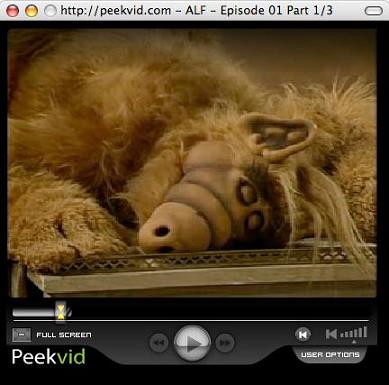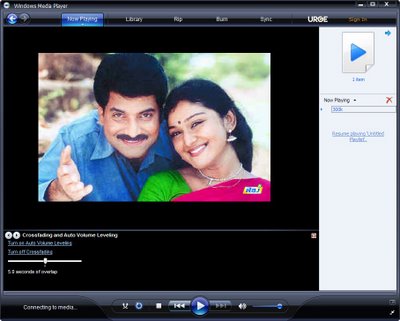Aug 5, 2008 1
The Nation-Wide Web: Why Licencing is a Dead End
Anyone out there know what the WWW in www.ignisfatuus.com stands for? That’s right — “world wide web.” Forgetting for a moment that “worldwide” is a single word, there’s another problem with this acronym: namely, the web is not always worldwide. Nationwide, maybe.
Oh, you can access the network, technically, but can you get at the information? Take, for example, Hulu, which I have cited repeatedly, both as a source of TV online and as a site that blocks anyone from outside the US. Sure, you can get to the page that says “We’re sorry, currently our video can only be streamed within the United States,” etc. etc. But can you access the programming itself? No, no you can’t. This is an example of an external information cloud: a bunch of content theoretically accessible from anywhere, but locked behind a wall. In this case, an IP address registered within the US is the key.
The reasons for doing this seem logical on the surface. Television has a similar model in place: American shows broadcast or carried by cable into Canada pose no problem under most circumstances, but what if a Canadian carrier has paid to licence the same content in Canada? If Global is going to pay millions of dollars each year for the right to broadcast Survivor in Canada, it wouldn’t very well do to have CBS broadcasting the same content on another channel. The whole point of licencing non-syndicated content is exclusivity. The solution: simulcast (of course, that’s assuming you accept that a licence should guarantee exclusivity, and don’t believe Canadian channels should compete directly with American channels). The Canadian signal is substituted for the American one in cases where the American channel infringes on the Canadian licence; in situations where it doesn’t, American channels can show pretty much whatever they want.
While the merits of simulcasting are, in and of themselves, minimally controversial, things get cloudier when licencing web material. After all, webcasting already overlaps with TV broadcasting, since both show the same content in a single market. But if NBC wants to show their programming both on their own TV channel and on their website(s) within the US, nobody is going to contest their right to do it — it’s their content, and they own the copyright. Of course, once this webcast is accessible from anywhere on earth, it definitely undermines Canadian exclusivity — so these sites are blocked outside the US. But then whichever broadcaster holds the licence in Canada could — theoretically — show this programming online as well.
This sort of almost works … sometimes. To choose just one show as an example: South Park airs on Comedy Central in the US (the copyright is held by Viacom, and licenced to the Comedy Network in Canada; the Comedy Network is owned by CTVGlobemedia; Comedy Network shows a lot of Comedy Central programming, but they’re not directly affiliated). The Comedy Central website shows archived episodes of the show which are visible only from within the US, and the Comedy Network website shows archived episodes visible only from within Canada. And if you try to go to the Comedy Central website from within Canada, it automatically redirects you to the Comedy Network website (and, presumably, vice versa). It works like a charm, and everyone gets what they want, wherever they are.
… Unless the thing you’re looking for is Corner Gas, and you’re an American. Or unless you’re a Canadian looking for Reno 911. Then you’re out of luck.
All the rules of simulcasting and exclusivity apply only to programming for which there is an active licence. Anything unlicenced for broadcast in Canada (like, for example, Reno 911) should be available — if the broadcaster chooses to make it available — because it doesn’t conflict with a Canadian licence. Unfortunately this is seldom the case. And if you include recordings going back to the beginning of TV, the amount of unlicenced (or non-exclusively licenced, such as syndicated) TV content is immense.
This is to say nothing of made-for-web content. If Internet broadcast does replace TV entirely, which certainly seems likely, then one day soon all video content will be made-for-web content. How will we licence internationally then? The current model, where only a finite amount of content finds its way onto TV, all of it licenced, cannot exist in an online world. To even think of licencing the entire Long Tail of potential web content is preposterous. Which is not to say that someone won’t try it — but it would be ridiculous. The model of national licences simply will not work when a) all content is (hopefully) accessible from anywhere, and b) the amount of content is several orders of magnitude larger than we find on our TVs today.
So what would work? One important distincion: licencing is complicated; copyright is not (this is relatively speaking, of course — copyright can still be a nightmare, especially when it involves licenced materials). At its most basic, the creator of a work of art holds the copyright, and any revenue generated by the work goes to the copyright holder. Copyright is transferable, but generally, it belongs to one discrete entity, whether that entity is Michael Creighton or CTVGlobemedia or The Estate of M. C. Escher. Copyright is ownership. Licencing, on the other hand, is more like permission — and permission can be granted to as many people as you like, assuming you don’t have restrictions placed on whom you can give permission to, such as no two entities distributing using the same medium and within the same market, or placed on how long the permission lasts, for example, the first five year window with national exclusivity for two years and with first option to renew after five years. Blah.
It would be much, much simpler to just distribute the content everywhere from whatever portals the copyright holder approves of, give a cut of the revenue to the distributor and give the rest to the copyright holder. Oddly enough, this is exactly what YouTube does. Ignore for the moment both the illegal material on the site, and the non-monetisable UCG, and focussing on the original content that YouTube essentially licences from specific groups: YouTube pays its most popular content providers a cut of their ad revenue. Because there’s no exclusivity, and because YouTube licences the material directly from the copyright holder, and because they can distribute it worldwide, and because the licence fee is proportional to the revenue the clips generate (and is paid only after the revenue has been generated — not before, like TV licences), the whole process is very streamlined.
Following this model, in the future all video distribution could look like this: content is submitted to a distributor like YouTube, and once it has been cleared as original (that is, not in violation of someone else’s copyright) it’s posted to the entire world, with ads embedded. The distributor gets a cut of the ad revenue and gives the rest of the profit to the content creator. Everyone’s happy.
There’s complications, naturally; as with all copyright, how do you deal with issues of fair use, parody and satire? What about scammers who artificially inflate the popularity of their clips? What if a kid posts a home movie using some copyright music in the background? What about obscenity and illegal pornography? How long does copyright last until it expires? These headaches are nothing, however, next to the impossible task of individually licencing every clip on the Internet, for every country on earth. 10 million videos times 195 countries? That’s a whole lot of contracts — and that’s just the tip of the iceberg. It could spell literally tens of billions of contracts within decades. Far easier to just assume licencing is universal and pay out an agreed-upon rate.
So far, TV content online is finite and relatively easy to control — but more importantly than that it, like the rest of the videos on the Internet, it is not particularly profitable anyhow. Licencing web videos has not really been a priority for major content producers yet. But that will change; like everything else informing Internet policy, it requires participation from people like you and me to ensure that our interests are protected. This means being informed about what webcast licencing looks like, and knowing how to evaluate different schemes proposed by the industry, which don’t necessarily take viewers’ interests to heart. This will be an important issue; we need to know what we want, or we won’t like what we get.


